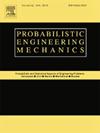Novel Bayesian updating based interpolation method for estimating failure probability function in the presence of random-interval uncertainty
IF 3
3区 工程技术
Q2 ENGINEERING, MECHANICAL
引用次数: 0
Abstract
Under random-interval uncertainty, the failure probability function (FPF) represents the failure probability variation as a function of the random input distribution parameter. To quickly capture the effect of the distribution parameters on failure probability and decouple the reliability-based design optimization, a novel Bayesian updating method is proposed to efficiently estimate the FPF. In the proposed method, the prior augmented failure probability (AFP) is first estimated in the space spanned by random input and distribution parameter vectors. Subsequently, by treating the distribution parameter realization as an observation, the FPF can be estimated using posterior AFP based on Bayesian updating. The main novelty of this study is the elaborate treatment of the distribution parameter realization as an observation, whereby the FPF is transformed into the posterior AFP based on Bayesian updating, and can be obtained by sharing the prior AFP simulation samples. The computational cost of the proposed method is the same as that of estimating the prior AFP. To improve the efficiency of recognizing the sample state, and improve AFP and in turn FPF estimation, the adaptive Kriging model for random-interval uncertainty was inserted into the proposed method. The feasibility and novelty of the proposed method were verified on several examples.
基于贝叶斯更新的新插值法,用于在存在随机间隔不确定性的情况下估计故障概率函数
在随机间隔不确定性条件下,故障概率函数(FPF)表示故障概率变化与随机输入分布参数的函数关系。为了快速捕捉分布参数对失效概率的影响,并将基于可靠性的设计优化解耦,提出了一种新型贝叶斯更新方法来有效估计 FPF。在所提出的方法中,首先在随机输入和分布参数向量所跨越的空间中估计先验增强失效概率(AFP)。随后,通过将分布参数的实现视为观测值,可以使用基于贝叶斯更新的后验失效概率估计 FPF。本研究的主要新颖之处在于将分布参数实现作为一个观测点进行了精心处理,从而将 FPF 转化为基于贝叶斯更新的后验 AFP,并可通过共享先验 AFP 模拟样本获得 FPF。拟议方法的计算成本与估计先验 AFP 的计算成本相同。为了提高识别样本状态的效率,改进 AFP 并进而改进 FPF 估计,建议方法中加入了随机区间不确定性的自适应克里金模型。该方法的可行性和新颖性在多个实例中得到了验证。
本文章由计算机程序翻译,如有差异,请以英文原文为准。
求助全文
约1分钟内获得全文
求助全文
来源期刊

Probabilistic Engineering Mechanics
工程技术-工程:机械
CiteScore
3.80
自引率
15.40%
发文量
98
审稿时长
13.5 months
期刊介绍:
This journal provides a forum for scholarly work dealing primarily with probabilistic and statistical approaches to contemporary solid/structural and fluid mechanics problems encountered in diverse technical disciplines such as aerospace, civil, marine, mechanical, and nuclear engineering. The journal aims to maintain a healthy balance between general solution techniques and problem-specific results, encouraging a fruitful exchange of ideas among disparate engineering specialities.
 求助内容:
求助内容: 应助结果提醒方式:
应助结果提醒方式:


